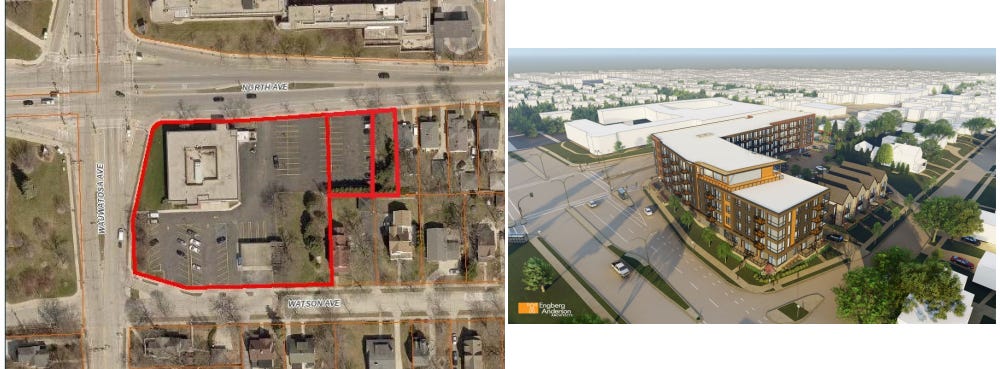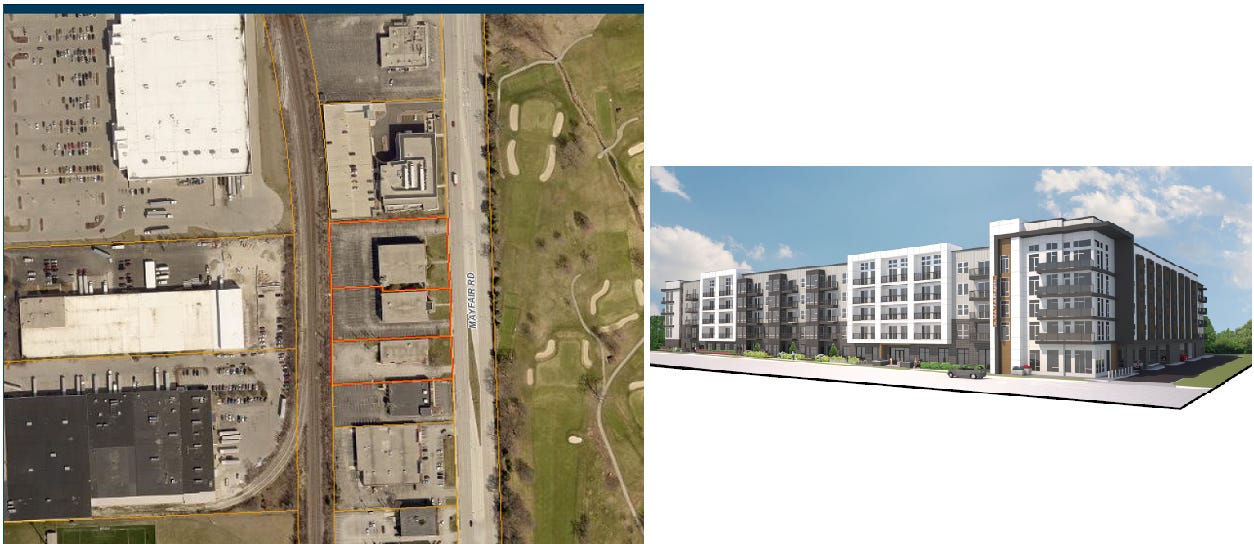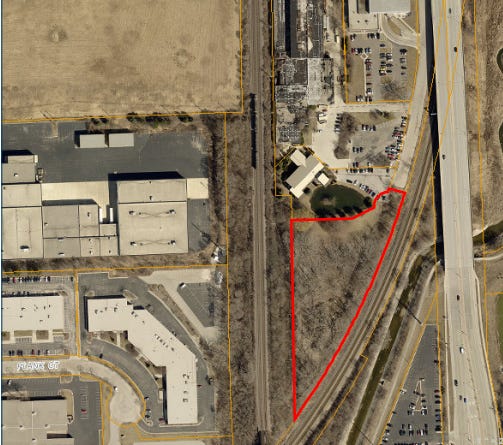Over the last two weeks, three development projects in the city passed various hurdles on their way to breaking ground. Mostly the process was straightforward and perfunctory. Occasionally it threatened to descend into a cross between Kafkaesque nightmare and an Abbott and Costello routine.

→ Cornerstone Village. Located at 7423, 7429, and 7501 W. North Avenue, Cornerstone Village is a 5-story, L-shaped, mixed-use residential development with affordable units for the developmentally disabled along with five townhomes along Watson Avenue. The first level will contain a BMO Harris bank branch, a coffee shop, and a training center for people with developmental disabilities.
Initial plans for the Planned Unit Development were approved by the Plan Commission in December, and the developer sought approval of its final plans at the Community Affairs Committee meeting on April 12. It will consist of:
41 1-bedroom,
26 2-bedroom, and
13 3-bedroom units along with
4 3-bedroom townhomes.
Twenty-four units in the apartment building will be for mentally disabled adults, with 20 subsidized units set aside as affordable for those at 50% (9 units @ $786/mo.), 60% (7 units @ $943/mo.), and 80% (3 units $1,260/mo.) of the median income. The developer has contacted Milwaukee County to look at potential subsidies to reduce rents further. Other changes from the initial proposal mostly appeared to revolve around concessions to neighbors, like the addition of higher fencing to prevent car headlights from shining into adjoining homes. The Community Affairs Committee recommended its final plans for approval by a 7-0 vote on April 12. The Common Council approved the resolution unanimously 16-0.
One interesting aspect of this development is that a number of the units are subsidized via Tax Incremental Financing (TIF). This is a somewhat confusing topic that I would like to cover in more depth later, but my understanding is that a development like this will increase assessed property values which in turn produce greater tax revenue. The city agrees to use that additional tax revenue to pay for some portion of the development’s costs for a certain period of time instead of using that money for the things we usually use taxes for (schools, roads, police, etc.). Some people are critical of this type of funding, because they think developers should bear these costs. Others see it as a necessary mechanism to encourage developers to build things that they might not otherwise build. A Milwaukee Journal Sentinel article from last week provides some additional information on how this mechanism works.
I’ll admit to not having a full grasp of how TIF is usually coordinated with the process of getting a development approved and beginning construction, but according to the developer their application for Tax Incremental Financing is still pending. The developer has 12 months to begin construction once final plans are approved. If the TIF application is not approved can the developer just replace all the subsidized units with market rate ones? Not sure.

→ North Mayfair Apartments. Located at 2929 N. Mayfair Road, North Mayfair Apartments is a 5-story residential development. The first level will house a lobby and various apartment amenities.
Initial plans for the Planned Unit Development were approved by the Plan Commission in December, and the developer sought approval of its final plans at the Community Affairs Committee meeting on April 12. It will consist of:
204 studio and 1-bedroom units,
50 2-bedroom units, and
4 3-bedroom units.
The developer expects this will provide up to $654,000 in additional property tax revenue for the city.
Ald Tilleson welcomed the development and moved to approve but said:
This is better than what it looked like when it first came to us when it had the weird red stripes on it [Ald. Wilke chuckles], but it still, I mean, to be honest, Mr. Campbell, it’s still a bit generic for my liking, so I hope that if you do come and do a third project in the city with us at some point in the future—which I welcome—that you consider different architecture to make it less generic.

→ Staybridge Suites. When a developer wants to build something, he often needs the common council to approve his plans. Approvals usually come with contingencies—your plans are approved so long as you do this, this, and this. This might be “prove to us the sewer is big enough to handle all the extra toilets you’re going to connect to it,” or “tell us how much it will cost to build so that we can tax you.” If you don’t meet the conditions—usually within a year—the plans lapse, and you have to ask all over again.
Jay Walia and his development entity—Slinger Cheese, LLC—wanted to build a Staybridge Suites hotel on a (cheese-?)wedge shaped piece of land at 1401 N. Mayfair Rd. He received approval from the Common Council in October, 2019, to rezone the property as a Planned Unit Development (PUD). Plans were submitted to the city for review in February, 2020.
Around this time Mr. Walia started to have serious doubts about whether a hotel for business travelers was really going to be the sure-win he thought it would be, and he filed for a two-year extension on meeting all the previous contingencies for final plan approval. The two-year extension was granted unanimously via Resolution R-21-008 but was itself subject to several additional contingencies:
Pay for the Engineering Department to review your plans.
If you don’t start building something by June 1, 2021, reseed and turf the vacant lot until you do.
Provide a written update to staff within six months of approving the extension.
Legislating and contract law, I am learning, is a little like computer programming. In programming, you have to be very explicit about what you want the computer to do, and if you happen to have a typo or a missing semi-colon or something, the compiler will choke, throw some unhelpful error that you have to spend time deciphering, and stop. In this case, the compiler is the Common Council and the program is resolution R-21-008.
For instance, the last condition is to “Provide a written update to staff within six months of approving the extension,” but the extension itself is subject to having completed these three conditions. So if the extension isn’t granted until he’s met all the conditions, but one of the conditions for approving the extension requires him to do something after the extension is approved, Mr. Walia appears to be caught in some sort of logical paradox that neither he nor his hotel can ever escape.
Now, no one actually got sucked down this particular administrative worm-hole which suggests maybe my reading of this particular requirement is incorrect and everyone else understood what the Common Council wanted. The real issue was actually condition (2): that Mr. Walia reseed and turf his vacant lot if he hasn’t started building something by June 1, 2021.
But it’s April, 2022, and Mr. Walia never reseeded his field. He’s ready to build his hotel, because people are using planes again, and he submits updated plans to the city planning department for review. But they won’t review them because he doesn’t have an extension because he never completed all the conditions to receive one. Mr. Walia thinks it’s silly to seed and turf the field if he’s just going to tear it up again to build his hotel. He asks for an extension to the extension, so he can start building without going through the entire approval process again.
If you’re getting lost, you’re not alone. A 45-minute conversation then ensued between the developer’s (Mr. Walia’s) attorney, the city’s attorney, several members of the common council, the city’s development director and Mr. Walia himself. Their conversations mostly seemed to consist of some people trying to get on the same page and in the process other people falling off the page. Also, there were digressions on rats, whether one should use the term weeds or wildflowers to describe the flora on Mr. Walia’s plot of land, and how the property looked 40 years ago.
The dialogue below is not verbatim and has been shortened to preserve sanity. Consider it a dramatization:
City Attorney [introducing the issue]: The council granted final approval for the plans subject to 13 conditions. We then granted an extension to complete those 13 conditions for final approval subject to 3 new conditions which have not been met. The developer’s attorney is asking the Common Council to reconsider those conditions so that his client can start building his hotel.
Developer Attorney: I took some pictures of the vacant lot this morning. I think it looks great. We just need the council to give the green light so we can start building a hotel. We don’t want to build a soccer field.
Ald. Tilleson: Whoa, whoa, whoa. Calling it a soccer field is generous. It looks like a wasteland.
Developer Attorney: No, no, we don’t want to build a soccer field. The conditions for the extension asked us to reseed and turf the field. But this seems silly, because we’d rather build a hotel there.
Ald. Tilleson: Fair enough. But what took so long?
Developer Attorney: There was a pandemic.
Ald. Tilleson: So, what are you requesting? Are you asking for an extension? Until what date?
Developer Attorney: Well, I don’t think we technically need an extension, because I don’t think our approval has lapsed. But however you want to word it so we can start building. If you want to extend the extension that’s fine. Each week that someone in City Engineering doesn’t look at our plans is another week we can’t start building.
Ald. Tilleson: Well, you can say all you want that you don’t think the deadline has passed, but your client took almost a year to get approval. That’s fine, but this is probably a rat-infested field right now. Residents complain about rats in this city, and we’re always trying to find out where they’re coming from. They’re probably here.
Ald. Byrne: Your biggest mistake was telling us we’re not getting a soccer field. My daughter was looking forward to that. I don’t think blaming the City Engineering department is the best strategy, but I agree that we would like to get this started. How much time should we grant for the extension?
[Much back-and-forth between the Developer’s Attorney, the city’s Development Director, and City Engineering Department about whether the extension should be for 90 days or 120 days]
Ald. Byrne: I would like to make a motion that we modify the Planned Unit Development final approval extension conditions of 1401 N. Mayfair Rd. by 120 days.
City Clerk: Umm, can you repeat that?
[Ald. Byrne repeats]
Ald. Wilke: Do we have someone to second the motion?
Ald. Dubinski: Wait, I have a comment. I’ve been an alder for 11 years. I’ve never seen a requirement for seeding and turfing. They want to build a hotel. Why are we asking them to plant grass there first?
[ Ald. Wilke tries to explain: If developers are going to clear land but not develop it any time soon, they need to plant grass there to prevent runoff and other problems. ]
Ald. Dubinski: I’ve been back in that area as early as 1979. It’s always looked like that up until a few years ago when they cut down some of the trees. They want to start building right away, so why don’t we let them?
Ald. Wilke: That’s what we’re trying to do. But my understanding is they already have an extension until next January, so we don’t need an extension to an extension. The only hangup is the June 1, 2021, deadline for reseeding. And they didn’t do it. So why not just drop this requirement?
City Attorney: Just to be clear, they are not under a 2-year extension. Because they didn’t satisfy all three conditions. And I think we need to keep the 120-day extension requirement in case they don’t start building before then.
Ald. Dubinski: Why can’t he just get a chipper to get rid of these logs and forget all this planting grass stuff? He wants to build his hotel.
City Attorney: My interpretation of what Ald. Byrne said is that they have 120 days to start building or they have to plant grass.
Ald. Wilke: Ald. Byrne is that your intention?
Ald. Byrne: My intention is not to discuss the philosophy of why we decided to require turf months or years ago. We have a plan. Lets keep these 3 conditions.
Ald. Wilke: So if you don’t start construction in 120 days, you need to seed.
Mr. Walia [stepping up to the podium]: Umm, just so I understand, we want to start this as soon as possible. I need to make sure I don’t need to do this second condition if I get a building permit.
Ald. Wilke: But if you don’t start within 120 days you need to reseed.
Ald. Dubinksi: I did want to add that the developer probably wants to do something about the rats before he starts digging.
Ald. Wilke: Okay, any other comments, or are we ready—oh, Ald. Welch.
Ald. Welch: At risk of being tedious, we talked about aesthetics, but it’s also important that we address any invasive species on the site. I don’t know if there are any, but I just wanted to throw it out there.
Ald. Wilke: Do you want them to mow the weeds?
Ald. Welch: I’d like them to keep the weeds under control so that invasive species don’t spread to other areas.
Ald. Wilke: Do you want that added to the conditions?
Ald. Welch: Uh, sure. [Addressing Ald. Byrne] Can you add that to your motion?
Ald. Byrne: I don’t understand. This seems vague. Can the developer’s attorney come up here? Are you mowing the property right now?
Developer Attorney [stepping up to the podium]: I’m sorry what was the question?
Ald. Byrne: Is it reasonable to ask for a weed mow-down right now? What are you already doing?
Developer Attorney: My client did clear out the logs last fall. It’s natural growth now. I don’t know if they’re weeds or wildflowers. I’m not an expert. Maybe if we haven’t started construction in 60-75 days, we could mow it? We would rather not have someone go through to hand-weed invasive species. Maybe we can confer with staff—they have landscape personnnel—to identify any areas with invasive weeds that we need to take care of.
City’s Development Director: I’d ask that you not include the staff in this. The attorney has said they would handle any patches of invasives after 60-75 days.
Attorney Developer: Yeah, I guess we can work with our landscape team. I’ll be honest, I don’t think it looks that bad. But yeah, I don’t want invasive species.
Ald. Byrne: How many fields do we have like this in Wauwatosa right now?
City’s Development Director: I don’t know. Not many. Weeds started growing as soon as they cut the trees down. It’d be quite an undertaking for our landscape architect to go out there and take a look at all the species and determine what needs to go or not. So I’d put that burden on the developer. If it’s significant, they should remove it. As our code dictates, you’re not allowed to have invasives.
Ald. Byrne: Can you define invasive or define a way to assess invasives?
City’s Development Director: There’s a long list provided by the Department of Natural Resources.
Ald. Byrne: How much will it cost the developer to assess that?
City’s Development Director: I don’t know. It’s a big piece of land. I don’t think we want them to incur costs they don’t have to. So the quickest way is to just pull the building permit.
Ald. Byrne: Okay. So, I will add that without shovels in the ground within 90 days the developers must have hired a company to assess the land for invasive species. So you have 120 days to start construction, but if it takes longer than 90 you need to assess for invasive species.
Clerk: Wait a second, this is the clerk. Is the requirement 90 days or 120 days?
Ald. Byrne: Within 90 days, should there not be development, the developer is required to hire a company to assess for invasive species and follow a mitigation plan to assess for such invasive species.
Ald. Wilke: Seconded? [Someone raises their hand] Okay! [Looking satisfied] There we go, we got it. [Looks around hopefully] I don’t see anyone anxious to make any more comments. All in favor as amended—thoroughly—say ‘Aye.’
[Developer Attorney leaves the podium.]
[Chorus of ‘Aye’s]
Ald. Wilke: We look forward to this starting…hopefully in 90 days.



